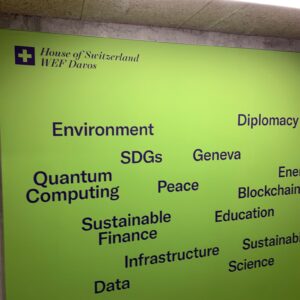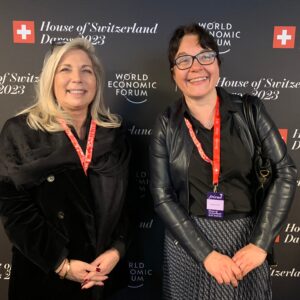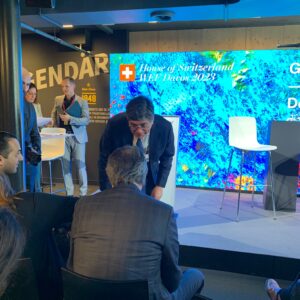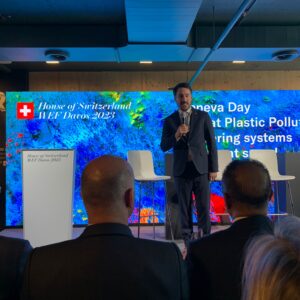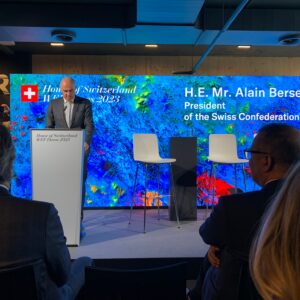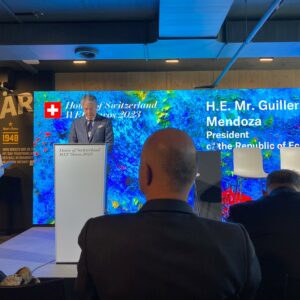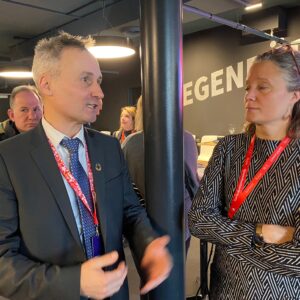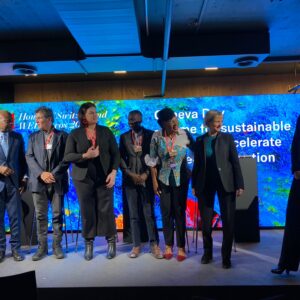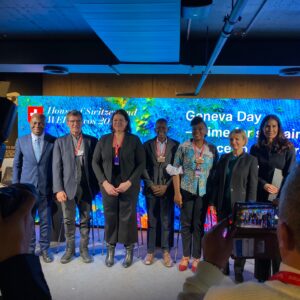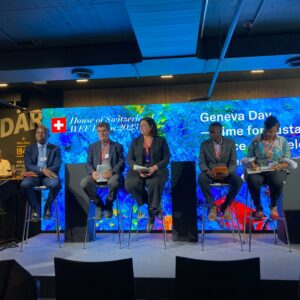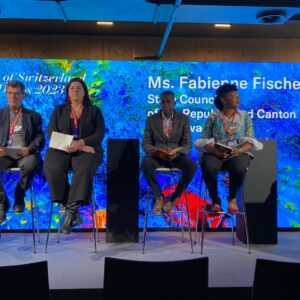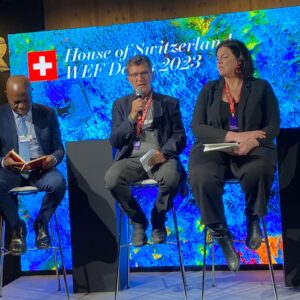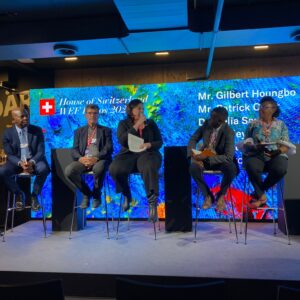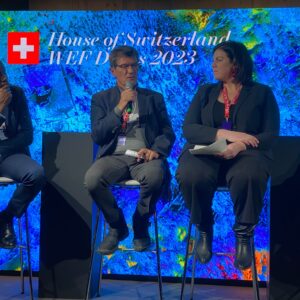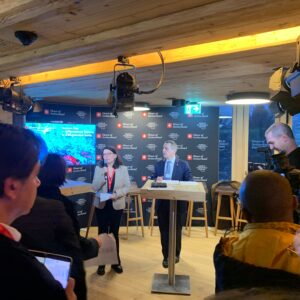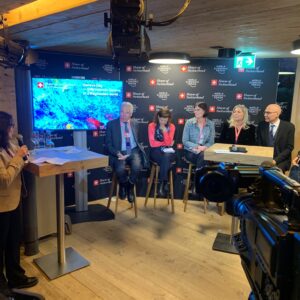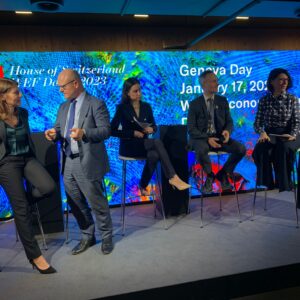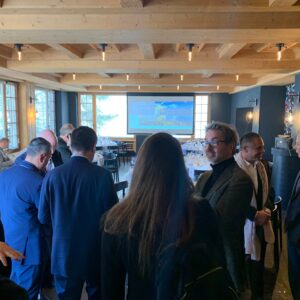Événement Conférence
International Geneva & Environment @ World Economic Forum Annual Meeting 2023

Global leaders met in-person at the World Economic Forum Annual Meeting in Davos from 16 to 20 January 2023. The 53rd Annual Meeting convenes leaders from government, business, and civil society in the snow-bound Swiss town of Davos to address the state of the world and discuss priorities for the year ahead. More than 2,700 representatives from 130 countries attended this year’s edition.
World Economic Forum Annual Meeting 2023
With the theme, “Cooperation in a Fragmented World”, the 2023 edition of the World Economy Forum Annual Meeting convened leaders from government, business, and civil society to address the state of the world and discuss priorities for the year ahead.
It provided a platform to engage in constructive, forward-looking dialogues and help find solutions through public-private cooperation.
Many sessions were livestreamed publicly on the Forum’s website and social media channels, as well as its digital app, TopLink, providing an opportunity for the Forum’s Digital Members community and the public to engage in deliberations.
Global Risks Report 2023
Ahead of the Annual Meeting, the Forum published the Global Risks Report 2023 exploring some of the most severe risks we may face over the next decade, with environmental risks featured at the top of the list. As we stand on the edge of a low-growth and low-cooperation era, tougher trade-offs risk eroding climate action, human development and future resilience.
The Global Environment Agenda
Various actors for the Geneva community took part in the discussions in Davos to foster the dialogues on nature and climate, as one of the key themes of the forum. Many sessions were accessible to the public through live stream; relevant sessions on the environmental agenda include:
16 January
- I Sea You | Opening concert | 18:30–19:15 CET
- Open Forum: In Harmony with Nature | 18:30–19:30 CET
17 January
- CEO roundtable breakfast: End to end transformation: The path to Net Zero | WBCSD | 07:45 –08:45 CET
- Philanthropy: A Catalyst for Protecting Our Planet | 08:30–09:15 CET
- Mastering New Energy Economics | 08:30–09:15 CET
- Open Forum: Sustainably Served | 09:30–10:30 CET
- Decarbonization: An Insurmountable Challenge? | 09:45–10:30 CET
- Press Conference: Philanthropic-Public-Private Partnerships for climate & nature (GAEA) | 10:00–10:30 CET
- End Plastic Pollution: Multilateral Cooperation at its Best | 13:00–13:45 CET
- See you in Court! The Rising Tide of Climate Litigation | 15:15–15:45 CET
- Launch of the NZIA Target-Setting Protocol | UNEP FI | 15:45–16:45 CET
- Infrastructure for a Clean Energy Economy | 16:15–17:00 CET
- Open Forum: Propelling Planetary Prosperity | 18:30–19:30 CET
- Nature positive dinner: towards a nature positive society | WBCSD | 20:00–22:00 CET
18 January
- Accelerating decarbonization through greenhouse gas emissions transparency | WBCSD | 07:45–10:00 CET
- Don’t Let Greenwashing Fears Stall Credible Action | 11:30–12:15 CET
- Circularity Gap: Meeting societal needs and preserving global resources | Impact Hub Switzerland | 12:00–14:00 CET
- Open Forum: Mobilizing for Climate | 12:30–13:30 CET
- Revamping Investment for Regenerating Nature | 12:30–14:30 CET (invite only)
- Putting Health at the Heart of Climate Action | 13:15–14:00 CET
- Leading the Charge through Earth’s New Normal | 14:00–15:00 CET
- Bringing Circularity to Life | 15:00–15:45 CET
- Keeping the Pace on Climate | 16:15–17:00 CET
- AI for Climate Adaptation | 17:30–18:15 CET
19 January
- Youth Agency over Earth’s Future | 09:00–09:45 CET
- The Age of Net-Zero Energy Technologies | 09:00–09:45 CET
- Open Forum: Pack Up and Go – Climate Migration | 09:30–10:30 CET
- Business Action in Nature | 11:30–12:15 CET
- Climate Finance: Reaching Velocity | 11:30–12:15 CET
- Roundtable lunch: The business case to invest in landscapes – unlikely alliances to accelerate core supply chain transformation | WBCSD | 13:15–14:15 CET
- Press Conference: Launch of the Coalition of Trade Ministers on Climate | 17:15–17:45 CET
Geneva Day @ House of Switzerland
“Geneva Day” at the House of Switzerland in Davos is to create a platform to connect global leaders present in Davos with Geneva-based global governance institutions and to discuss and present how International Geneva contributes to finding solutions to global issues.
The Geneva Day 2023, on Tuesday 17 January, looked at some of the key issues around which building multi-stakeholder partnerships to address the triple planetary crisis, to acceleration sustainable finance and circular economy as well as to better harness the potential of science to inform policy-decisions and multilateral diplomacy.
This event was by invitation only.
- Beat Plastic Pollution: Delivering systems change at speed and scale | 13:45–15:00 CET
- Time for sustainable finance to accelerate the decarbonization of the economy | 16:00–17:00 CET
- International Geneva in a fragmented world | 17:00–18:00 CET
- Harnessing the power of data to shape the future | 18:00-19:00 CET
Other events at the House of Switzerland:
- Amplifying Sustainability from the Boardroom | 17 January, 09:00-12:00 CET
- Re-Thinking Energy Infrastructure: Decarbonization Deployment at Scale | 18 January, 11:00–13:30 CET
- Re-think infrastructure sustainably: Large Infrastructure Window | 18 January, 14:00–15:00 CET
Coalition of Trade Ministers on Climate
A new Coalition of Trade Ministers on Climate, which aims to put climate action at the heart of trade and trade policies, was launched on 19 January 2023, in the margins of the WEF Annual Meeting 2023. The four co-leaders – trade ministers from Ecuador, the European Union, Kenya, and New Zealand – held the Coalition’s first inter-governmental meeting in Davos, along with ministers from many other countries, which was followed by a roundtable of stakeholders from international organisations, academia, business, and NGOs.
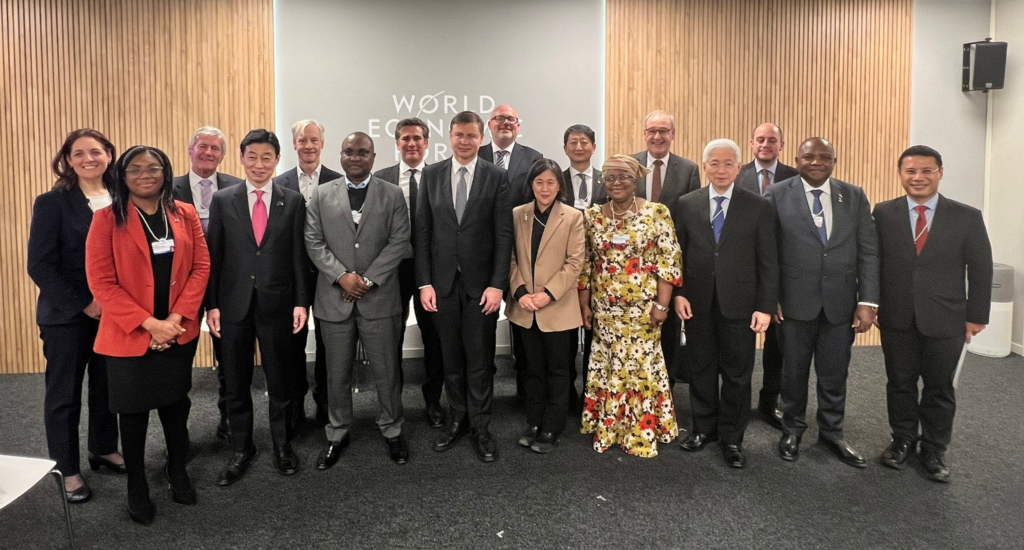
With more than 50 ministers who have joined the coalition, World Trade Organization (WTO) Director-General Ngozi Okonjo-Iweala and UN Conference on Trade and Development (UNCTAD) Secretary-General Rebeca Grynspan have also offered their support.
The Coalition seeks to provide high-level leadership and guidance to boost inclusive international cooperation on the nexus of climate, trade, and sustainable development. Emphasizing the urgent need for climate change mitigation and adaptation, the Coalition aims to drive cooperation among trade ministers in the global response to climate change, including by engaging nationally and internationally with fellow ministers working on climate, environment, finance, and development, among others.
Agreement on Fisheries Subsidies
On Friday 20 January, Switzerland became the first WTO member to formally submit its acceptance of the WTO’s new Agreement on Fisheries Subsidies, paving the way for the historic agreement for ocean sustainability to enter into force. Acceptance from two-thirds of WTO members are needed for the Agreement to come into effect. The agreement was adopted by consensus at the WTO’s 12th Ministerial Conference (MC12) held in Geneva last June, setting new binding, multilateral rules to curb harmful subsidies, which are a key factor in the widespread depletion of the world’s fish stocks.
In addition, the Agreement recognizes the needs of developing and least-developed countries (LDCs) and establishes a Fund to provide technical assistance and capacity building to help them implement the Agreement. The Agreement prohibits subsidies to illegal, unreported and unregulated (IUU) fishing, and bans subsidies for fishing overfished stocks and for fishing on the unregulated high seas. Members also agreed at MC12 to continue negotiations on outstanding issues, with a view to making recommendations by MC13 for additional provisions that would further enhance the disciplines of the Agreement.
Highlights at the WEF Annual Meeting 2023
The environment is high on the agenda of the WEF. Here are some key quotes and highlights from the week.
Geneva Day
Opening
We live in unprecedented times. Challenges are more global than ever. Our world is facing strong headwinds of fragmentation. We need to look beyond our own horizons. We need to work towards different perspectives, and to lay the groundwork for an open and inclusive dialogue. Such an approach is the hallmark of International Geneva.
— Alain Berset, President of Swiss Federal Council
The International Geneva ecosystem represented today is unique. It allows for these exchanges, essential to process of finding solutions, not only to mitigate and effect of crises and solve them, but also to prevent them.
— Nathalie Fontanet, State Councilor, Republic and Canton of Geneva
Beat Plastic Pollution: Delivering systems change at speed and scale
No country is left untouched, not even a landlocked country like Switzerland… We need a global regulatory framework to reduce plastic pollution, enable a circular plastic economy, and to prohibit the most problematic and harmful substances.
— Alain Berset, President of Swiss Federal Council
We are united by a historic commitment, and we have come together to share our vision. With our commitment, we are indeed creating history. Humanity faces an urgent challenge. We must find a solution to the global crisis caused by plastic waste.
— H.E. Guillermo Lasso Mendoza, President, Ecuador
Two presidents from two different countries underlying the need and importance of international cooperation, showing the need to address the plastics crisis.
— Carolyn Deere Birkbeck, Director, Forum on Trade, Environment & the SDGs, Geneva Graduate Institute, moderating the event
I encourage our nations to support the development of a strong treaty. Developing national action plans without common obligations for action will not suffice. We need to establish common global rules that will lessen plastic production and demand to sustainable levels to enable a circular economy that protects the environment and human health, and stop the leakage of plastics into nature.
While we only have a short time to finalize the Plastics Treaty, this is not an excuse to water it down. It is a challenge to make it even more robust and ambitious. I’m confident we are up to the challenge.
— H.E. Jeanne d’Arc Mujawamariya, Minister of Environment of the Republic of Rwanda
Crisis is exactly what we’re facing. Science is becoming increasingly clear that it is one not just for ecosystems, but for humans as well. I have seen an incredible evolution of perception of the public about plastic pollution. When I was younger, it was an aesthetic outlook, while not it is a real concern about our future.
— Marco Lambertini, Special Envoy of WWF
Businesses are quite engaged in this treaty…, trying to come to something ambitious. The business community should not be left aside. Some of them might be seen as part of the problem, therefore, they should be seen as part of the solution.
We can’t just rely on private banks to secure [financing]. We need to think about the innovative space, and how we bring about incentives that can finance this work, as we’ve seen in COP27 in Sham el-Sheik and in the Biodiversity COP in Montreal.
— Kristin Hughes, Director, Global Plastic Action Partnership
I don’t think plastics pollution and health – that connection – has been given the attention it needed. And not only that, we don’t have research that documents well how plastics affect human health throughout the [product] lifecycle. They do actually.
I think we need to review all the studies that have been done and try to start communicating and support the treaty process. We cannot wait until we have more research. While doing more research, we should also make use of what we have — which already indicates problems throughout the lifecycle of plastics.
A toothbrush can break down in 500 years, if at all. It’s not about us, it’s about the many generations to come.
— Tedros Adhanom Ghebreyesus, Director General, WHO
Twitter Thread
Time for sustainable finance to accelerate the decarbonization of the economy
With Chatham House rules in effect, here are some key takeaways from the 2nd Geneva Day panel. Speakers have pointed out:
- The cost of inaction against environmental crises is much more expensive.
- A transition to a decarbonized economy require greener jobs as replacement.
- While new products and solutions, such as Nature-based Solutions, are needed, we need to unpack the perceived risks of new innovations.
- There’s a need for capacity-building and capital investment.
- Breaking silos among communities and sectors is important.
- Innovation in financing will be key, esp. in insurance sector.
- We also need to look more into climate adaptation strategies.
- We need to find mechanisms where risk issues can be addressed. Blended finance is a good way to do so.
A speaker has also pointed out:
We have to ensure a change of paradigm, where the world has to react to this importance of treating mitigation and adaptation. Adaptation to climate change cannot be treated with small or fragmented investment.
Twitter Thread
International Geneva in a fragmented world
We need multilateralism — that is very clear to face these challenges — but we also need to retool to transform the current architecture of multilateralism.
— Marie-Laure Salles, Director, Geneva Graduate Institute
Ignazio Cassis, Minister of Foreign Affairs of the Swiss Confederation, highlights environmental crises as one of 5 reasons behind an increase in the feeling of disruption and fragility: “The consequences of climate change and loss of biodiversity are becoming increasingly severe and costly.”
Multilateralism needs focus. Limited resources need prioritization in the most urgent problems: back to the roots.. Multilateralism requires subsidiarity. These interventions must be limited to problems that individual states cannot solve alone. Multilateralism must adapt its working methods. New technologies and evidence-based approaches must increase efficacy and efficiency. Multilateralism needs anticipation. We must build a future-oriented multilateralism.
Geneva is the birthplace of multilateralism. It is now the place where new working methods of multilateralism are being tested.
— Ignazio Cassis, Minister of Foreign Affairs of the Swiss Confederation
The biggest challenges today is the divisiveness around human rights issues. When the world is fragmenting into different blocks, roles and boxes, how do we bring the glue back together? The glue is human rights. Human rights is about the people. It is about our relationship among ourselves. It is about our relationship with the State. But it’s also our relationship with our planet and our environment.
— Volker Türk, UN High Commissioner for Human Rights
At the core of our human condition should be humanity. This is what Geneva should stand for at the end of the day. We who work and benefit from Geneva and from the ecosystem that Geneva provides us with have an inherent responsibility to uphold that situation and the capacity that Geneva holds because we will not be able to reinvent it.
— Mirjana Spoljaric Egger, President, ICRC
We must ensure that multilateralism is not a multilateralism of the privileged. It is a multilateralism that includes everyone… It is important that our multilateral perspective is inclusive, addresses all the needs existing in the world, and takes us into a different form of collaboration where we’re looking at enhancing innovation and science as a world community, and finding scientific solutions to addressing climate change, and beginning to implement these green solutions in Africa and other parts of the developing world.
— Naneli Pandor, Minister of International Relations and Cooperation of the Republic of South Africa
Twitter Thread
Harnessing the power of data to shape the future
Pascal Peduzzi UNEP/GRID-Geneva presents “Global Marine Sand Watch”, a project that aims to give more knowledge and science on global sand use. The project is expected to be launched in March 2023.
A representative from UNICEF provides a comment on how data literacy among the youth can help in collecting data, as well as providing exposure to environmental issues and impacts in their community.
Twitter Thread
Revamping Investment for Regenerating Nature
Statements
History is at a turning point and a shift towards greater social justice is vital to reinvigorate social progress, alongside economic growth.
Signs at #WEF23 of an understanding that economic, social and environmental concerns must be tackled together, and on an equal basis.
— Gilbert F. Houngbo, Director-General of the International Labour Organization
News
- Davos takes on climate finance: a lot of unanswered questions | Paula Dupraz-Dobias | Geneva Solutions | 24 January 2023
- Be prepared for the polycrisis era | Francesco Bassetti | Foresight | 20 January 2023
- Coalition Launch Statement | Coalition of Trade Ministers on Climate | 19 January 2023
- Amid Davos business talk, international community struggles to find a voice | Paula Dupraz-Dobias | Geneva Solutions | 19 January 2023
- WEF only ‘about tweaking the system’: rogue business leaders call for real wealth distribution | Paula Dupraz-Dobias | Geneva Solutions | 18 January 2023
- Special address by UN Secretary-General António Guterres to the World Economic Forum Annual Meeting in Davos, Switzerland: “The State of the World” | 18 January 2023
- Switzerland and Ecuador Appeal for Treaty to End the ‘Plastic Crisis’ | John Heilprin | Health Policy Watch | 17 January 2023
- Davos 2023 Day 1: What to expect | Gayle Markovitz & Beatrice Di Caro | WEF | 16 January 2023
- How to create a healthy ocean that benefits everyone | Peter Thomson | WEF | 15 January 2023
- Davos strapped between old and new as economy, war and climate set to dominate agenda | Paula Dupraz-Dobias | Geneva Solutions | 13 January 2023

